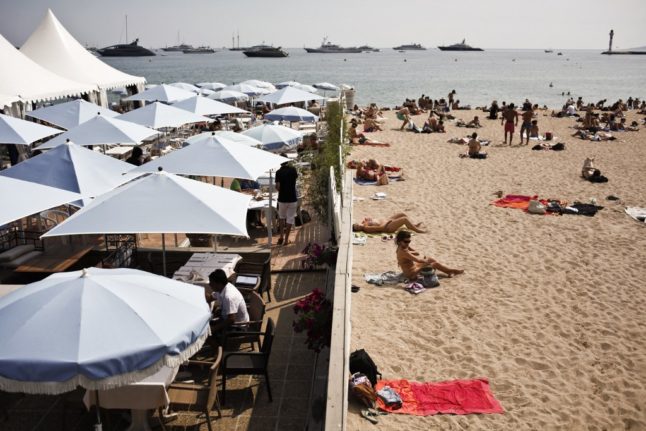Question: I read that all beaches in France are public property, but down here on the Riviera there are a lot of ‘private beaches’ – how do the rules actually work?
In France, everyone has the right to a dip in the ocean, though it might not seem that way when walking through certain areas.
There are 1,500 of these “private beaches” in France – the vast majority of them located on the Côte d’Azur.
They have become a source of controversy recently, after two private beaches in Juan-les-Pins were accused of racism and discrimination following an investigation and video circulated by French media Loopsider. The video (below) shows how a white couples receive different treatment than North African or Black couples.
Plus facile d’obtenir un transat sur les plages privées de la Côte d’Azur quand on est blanc, que quand on est une personne racisée. C’est ce qu’ont prouvé des militants de SOS racisme, lors d’un testing le 30 juillet à Juan-les-Pins.
Nous les avons suivis en caméra cachée. pic.twitter.com/AyWWZo3NQF
— Loopsider (@Loopsidernews) August 9, 2022
So what are these ‘private beaches’ and are they even legal in France?
In reality, none of these beachfront hotels, resorts or beach operators actually own that land, as the sea and the beach are considered ‘public maritime’ and are therefore the domain of the French state.
This means that technically there are no private beaches in France, as no one is supposed to be allowed to own the beach, though there are some caveats to that rule.
Since 1986, the State has been able to grant ‘concessions’ to allow for parts of the beach to be temporarily rented. Thus, hotels, resorts or beach operators can request a temporary rental of the beach for a specific period of time – the maximum duration being twelve years, which is renewable. If the local town hall agrees, then the renter will pay a fee (typically between €15,000 and €100,000 per year).
This might seem like a de facto way of allowing beaches to be privatised, but the few who manage to ‘rent the beach’ are still subject to some constraints. For instance, they are only allowed to occupy the beach for six months of the year (sometimes this can be extended up to eight months with the permission of the town hall, or twelve months in less common circumstances).
At the end of the season, they are required to dismantle their installations, so permanent private structures on the beach are therefore not allowed.
So you might see a waterfront resort, but they do not technically have ownership over the beach.
What about private deckchairs or sun beds next to the water?
This is another rule that is not always perfectly respected. Legally, any organisation that rents a part of the beach is required to leave a strip of “significant width” along the sea.
This is usually about three to five metres from the high tide mark, where members or the public can walk along the water or bring down their own towels or deck chairs down to the beach.
If a ‘private beach’ has deck chairs or sun-loungers right up against the water, there is a good chance the renting organisation is not following the rules.
Beachfront property
As the public has the right to be able to access the beach, homeowners are not allowed to block passage and can even incur fines for doing so.
The public must be able to pass through land to get to the beach, and cannot be blocked from the beach in front of a property.
Public access to the beach came into the spotlight due to a controversy surrounding a property of former American presidential candidate and statesman, John Kerry.
Kerry’s family owns a villa in Saint-Briac-sur-Mer in Brittany, and has fought a three-decade legal battle to be able to block the coastal trail on the property, which by French law, should be accessible to the public.
Despite the family siting potential ‘security threats’ should the beach front path be open to the public, local authorities backed plans to continue allowing public access in 2019.
What about building a waterfront property?
First, keep in mind that building in general in France is a heavily regulated process that requires planning permission.
You will not be able to build within 100 metres of the shoreline. If you buy a pre-existing coastal property, you will need to remember the three-metre rule discussed above and, as the Kerry family discovered, you are not allowed to block public access to the beach.
For ‘coastal zones’ specifically, there are more strict regulations and most plots of land by the sea are listed as protected natural areas, and therefore are not allowed to be built on.
Can access to the beach ever be forbidden?
Yes, as per the Coastal Law of 1986, local authorities can forbid access to the beach for “security, national defence or environmental protection.” During the Covid lockdowns several local authorities banned access to beaches to avoid illicit partying.
There are also several rules about what you are allowed to do – and not to do – while visiting French beaches, and some of them might surprise you.
READ MORE: The little-known French beach rule that could net you a €1,500 fine



 Please whitelist us to continue reading.
Please whitelist us to continue reading.
Member comments